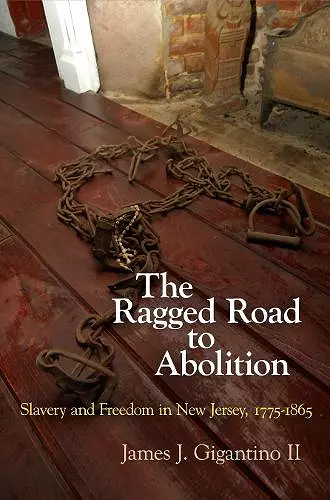The Ragged Road to Abolition
Slavery and Freedom in New Jersey, 1775-1865
Format:Paperback
Publisher:University of Pennsylvania Press
Published:5th Jan '16
Currently unavailable, and unfortunately no date known when it will be back

James J. Gigantino II shatters the easy dichotomy between free and slave states in early America. The Ragged Road to Abolition illustrates how slavery in New Jersey persisted until the ratification of the Thirteenth Amendment and reveals the myriad ways this marginalized the state's free blacks.
Contrary to popular perception, slavery persisted in the North well into the nineteenth century. This was especially the case in New Jersey, the last northern state to pass an abolition statute, in 1804. Because of the nature of the law, which freed children born to enslaved mothers only after they had served their mother's master for more than two decades, slavery continued in New Jersey through the Civil War. Passage of the Thirteenth Amendment in 1865 finally destroyed its last vestiges.
The Ragged Road to Abolition chronicles the experiences of slaves and free blacks, as well as abolitionists and slaveholders, during slavery's slow northern death. Abolition in New Jersey during the American Revolution was a contested battle, in which constant economic devastation and fears of freed blacks overrunning the state government limited their ability to gain freedom. New Jersey's gradual abolition law kept at least a quarter of the state's black population in some degree of bondage until the 1830s. The sustained presence of slavery limited African American community formation and forced Jersey blacks to structure their households around multiple gradations of freedom while allowing New Jersey slaveholders to participate in the interstate slave trade until the 1850s. Slavery's persistence dulled white understanding of the meaning of black freedom and helped whites to associate "black" with "slave," enabling the further marginalization of New Jersey's growing free black population.
By demonstrating how deeply slavery influenced the political, economic, and social life of blacks and whites in New Jersey, this illuminating study shatters the perceived easy dichotomies between North and South or free states and slave states at the onset of the Civil War.
"This magisterial volume sets the standard for examining slavery in New Jersey politics, economy, and society. More broadly, Gigantino deepens understanding of the state's role in sustaining the North's ambivalent stance on the peculiar institution." * Choice *
"James Gigantino II has written . . . the definitive book on the abolition of slavery in New Jersey." * American Studies *
"Gigantino . . . has written an accessible account of abolition that will be useful to New Jersey historians, educators, and even legislators." * Journal of American History *
"A fresh, well-documented tale that forces us to reconsider much of what we thought we knew about the social, political, and productive life of a young nation." * Susan O'Donovan, University of Memphis *
"The Ragged Road to Abolition does much more than fill a historiographical hole. It highlights how slavery and freedom operated on a continuum, rather than as oppositional states." * Hilary Moss, Amherst College *
- Winner of Awarded the 2015 Robert P. McCormick Prize by the New Jersey Historical Commission 2021
- Winner of Winner of the 2015 New Jersey Studies Academic Alliance Authors Award 2021
ISBN: 9780812223583
Dimensions: unknown
Weight: unknown
368 pages